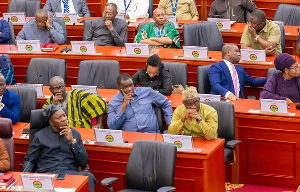In a statement released by Fitch Ratings, on Friday, 21 September, 2012, Ghana's economy was rated as B+, indicating a stable outlook. The rating from the London agency comes just as the economy needed some good news, after some bashing from the conservative Forbes Magazine and Standard & Poor's rating agency, both of the US.
In the statement, Fitch noted:
"Ghana's rating is supported by robust economic performance as well as a strong growth outlook. A good governance record and a favourable business environment in comparison to 'B' rated sovereigns also underpins the rating. However, Fitch highlights that weak macroeconomic management as well as a poor fiscal track record pose concerns.
Growth is forecast to average 8.6% over the next three years. It will be boosted by rising oil production, as well as the positive spillover effects on the broader economy from the development of the oil sector. Infrastructure spending, which is needed to reduce bottlenecks, will also boost growth."
The favourable rating has been pointed to by the government as evidence that the harsh criticisms by Forbes and S&P were a retaliation to Ghana's refusal to allow Kosmos Energy LLC to sell its stake in the Jubilee oil field to ExxonMobil.
I sought to discuss the rating with a Ghanaian trader and investor on Twitter. He said that with the interest rates of Ghana's bonds being 24%, investors were certainly not amused by Ghana's rating and were thus seeking such a high return. He said the fact that the bonds were oversubscribed did not mean much and that Germany's bonds were at 0% and Greece's were at 24%, same as Ghana.
I argued that Germany was trying to drive private sector investment and spending with that 0% rate, and the fact that investors are going for a 0% risk-free rate meant there's little or no confidence in investing in the economy. I also argued that Greece had a stable currency, the Euro, while the cedi had depreciated 16.8% against the $ from the start of the year, that meant investing in Ghana should have been riskier, but we have the same coupon interest rates on our bonds.
On Thursday, 23 August, 2012, the Bank of Ghana issued 5-year bonds hoping to raise GH?300m. The result: a close to 300% over subscription, with the government accepting close to GH?900m at a yield of 23%. About 90% of the bids were from foreign investors.
I think this outcome is a vote of confidence, despite the high nominal rates. With inflation at 9.5%, the real yield is 12.33%. If inflation does reach 12% by year end as the Centre for Economic and Policy Analysis (CEPA) is predicting, that's an even lower yield. Not forgetting the volatility of the cedi in an election year (although it has stabilised since July).
No need to get complacent though. The Institute of Statistical, Social and Economic Research (ISSER) of the University of Ghana have cast doubts on the government's ability to meet fiscal targets. They also pointed out the 67.7% of Ghana's public expenditure on salaries, and said that the salary increases must be matched by increased productivity. IMANI Ghana has also recently buffeted the Single Spine Payment Policy, believing it to be unsustainable. The rating is certainly good news, and it will boost investor confidence, but adopting some of the scepticism of my investor friend does make sense in this unpredictable financial world.
By: Jerome Wematu Kuseh
Opinions of Tuesday, 2 October 2012
Columnist: Kuseh, Jerome Wematu














